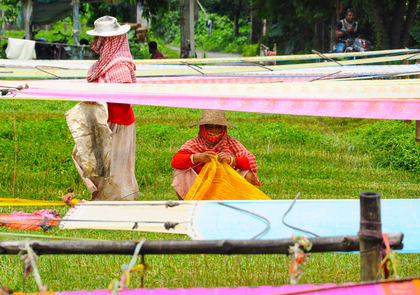Over 14,000 women handloom weavers skilled under SAMARTH scheme in last three years
By IANS | Updated: August 8, 2025 16:29 IST2025-08-08T16:23:30+5:302025-08-08T16:29:48+5:30
New Delhi, Aug 8 As part of the ongoing celebrations of Azadi Ka Amrit Mahotsav, the Ministry of ...

Over 14,000 women handloom weavers skilled under SAMARTH scheme in last three years
New Delhi, Aug 8 As part of the ongoing celebrations of Azadi Ka Amrit Mahotsav, the Ministry of Textiles has reaffirmed its commitment to empowering women handloom weavers through various central sector schemes.
In a written reply in the Rajya Sabha on Friday, Minister of State for Textiles Pabitra Margherita shared that over 14,000 women weavers have been trained under the SAMARTH scheme across the country in the past three financial years (2022-23 to 2024-25).
The Ministry is implementing schemes such as the National Handloom Development Programme (NHDP) and the Raw Material Supply Scheme (RMSS) to enhance the capabilities and livelihoods of handloom weavers, including women. While these schemes are gender-neutral, a 100 per cent subsidy is provided exclusively to women weavers for the construction of worksheds under NHDP.
The schemes provide financial assistance for raw material procurement, upgraded looms, solar lighting units, skill development, marketing support, technical infrastructure, and access to MUDRA loans. Scholarships for children of handloom workers and social security coverage are also included.
According to the data, Assam topped the list with 1,327 women weavers skilled under SAMARTH, followed by Kerala (1,056), Tamil Nadu (1,027), and Maharashtra (1,027). Other states like Odisha (727), Uttar Pradesh (727), Telangana (697), Manipur (579), Mizoram (498), Tripura (475), Karnataka (474), amongst others, also reported significant participation.
The SAMARTH scheme (Scheme for Capacity Building in Textile Sector) is a flagship initiative aimed at strengthening the skill base of the Indian textile workforce. It plays a crucial role in ensuring that traditional weavers, especially women, adapt to modern demands through technical training and capacity building.
The Ministry’s efforts are part of a broader push to revive India’s rich handloom heritage while ensuring sustainable livelihoods for women artisans.
Disclaimer: This post has been auto-published from an agency feed without any modifications to the text and has not been reviewed by an editor
Open in app